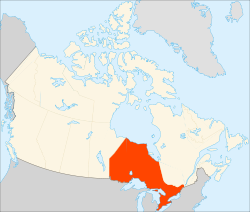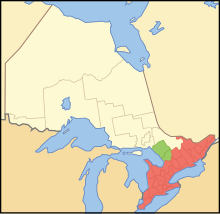Portal:Ontario
The Ontario Portal


Ontario (/ɒnˈtɛərioʊ/ ⓘ on-TAIR-ee-oh; French: [ɔ̃taʁjo]) is the southernmost province of Canada. Located in Central Canada, Ontario is the country's most populous province. As of the 2021 Canadian census, it is home to 38.5 percent of the country's population, and is the second-largest province by total area (after Quebec). Ontario is Canada's fourth-largest jurisdiction in total area of all the Canadian provinces and territories. It is home to the nation's capital, Ottawa, and its most populous city, Toronto, which is Ontario's provincial capital.
Ontario is bordered by the province of Manitoba to the west, Hudson Bay and James Bay to the north, and Quebec to the east and northeast. To the south, it is bordered by the U.S. states of (from west to east) Minnesota, Michigan, Ohio, Pennsylvania, and New York. Almost all of Ontario's 2,700 km (1,700 mi) border with the United States follows rivers and lakes: from the westerly Lake of the Woods, eastward along the major rivers and lakes of the Great Lakes/Saint Lawrence River drainage system. There is only about 1 km (5⁄8 mi) of actual land border, made up of portages including Height of Land Portage on the Minnesota border.
The great majority of Ontario's population and arable land is in Southern Ontario, and while agriculture remains a significant industry, the region's economy depends highly on manufacturing. In contrast, Northern Ontario is sparsely populated with cold winters and heavy forestation, with mining and forestry making up the region's major industries. (Full article...)
Selected article -
Southern Ontario is a primary region of the Canadian province of Ontario. It is the most densely populated and southernmost region in Canada, with approximately 13.5 million people, approximately 36% of Canada's population of 37 million. The region lies south of the province's other primary region, Northern Ontario, although the exact northern boundary of Southern Ontario is disputed. However, its core region is situated south of Algonquin Park, the latter being in an area of transition between coniferous forest north of the French and Mattawa Rivers and southern deciduous forest. It covers between 14 and 15% of the province, depending on the inclusion of the Parry Sound and Muskoka districts which also lie in the transitional area between northern and southern forest regions. Southern Ontario differs greatly from Northern Ontario, having a much higher population density, a different climate, and a different culture than its northern counterpart. It is broken into smaller subregions, including Central Ontario, Eastern Ontario, the Golden Horseshoe, and Southwestern Ontario.
The core area of Southern Ontario is part of the Quebec City–Windsor Corridor, which extends northeast into southern Quebec. The transitional northern area of this primary region extends north to the Mattawa River and occupies part of the Grenville Geological Province of the Canadian Shield, which also extends northeast into southern Quebec; most of Northern Ontario lies within the Superior Geological Province. (Full article...)General images
Surrounding areas
Selected biography -
Robert Theodore Bauer (February 16, 1915 – September 16, 1964) was a Canadian professional ice hockey right winger who played 10 seasons in the National Hockey League (NHL) for the Boston Bruins. He was a member of the famed "Kraut Line" with teammates Milt Schmidt and Woody Dumart. The trio led the Bruins to two Stanley Cup championships and became the first line to finish first, second and third in NHL scoring, in 1939–40. Bauer was named to the All-Star team four times and was a three-time winner of the Lady Byng Trophy, awarded for gentlemanly conduct combined with a high calibre of play. He recorded only 36 penalties in minutes in 327 games.
Prior to his NHL career, Bauer won the Memorial Cup with the St. Michael's Majors in 1934 as junior champions of Canada. He joined the Royal Canadian Air Force in 1942 and won the Allan Cup with the Ottawa RCAF Flyers as senior champions that year. Bauer turned to coaching following his NHL career and guided the Kitchener-Waterloo Dutchmen to two Allan Cup championships. The Dutchmen were sent to represent Canada at the 1956 Winter Olympics where Bauer coached the team to a bronze medal. He also coached the Canadian entry at the 1960 Winter Olympics that won a silver medal. Bauer assisted his brother David in creating the Canadian national hockey team in the 1960s. He was inducted into the Hockey Hall of Fame in 1996. (Full article...)Selected image
Did you know? -
- ... that Hilda Ranscombe captained a team that won ten consecutive Ladies Ontario Hockey Association championships?
Related projects and portals
Topics
Categories
Things you can do
- Help expand stub articles: There are numerous stub articles relating to Ontario. You can help by expanding them. See Ontario stubs for a list. Also, for geographical (places) stubs, refer to:
- Eastern Ontario: Eastern Ontario geography stubs
- Toronto: Toronto geography stubs
- Ottawa: Ottawa stubs - All stubs relating to Ottawa in general
- Northern Ontario: Northern Ontario geography stubs
- Western Ontario: Western Ontario geography stubs
- Golden Horseshoe: Golden Horseshoe geography stubs
Associated Wikimedia -
The following Wikimedia Foundation sister projects provide more on this subject:
-
Commons
Free media repository -
Wikibooks
Free textbooks and manuals -
Wikidata
Free knowledge base -
Wikinews
Free-content news -
Wikiquote
Collection of quotations -
Wikisource
Free-content library -
Wikiversity
Free learning tools -
Wikivoyage
Free travel guide -
Wiktionary
Dictionary and thesaurus







































